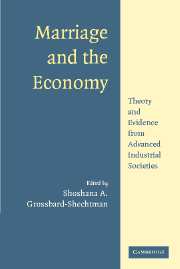Book contents
- Frontmatter
- Contents
- List of Figures
- List of Tables
- List of Contributors
- Foreword
- Acknowledgments
- Marriage and the Economy
- 1 Marriage and the Economy
- PART I THE ECONOMICS OF MARRIAGE AND DIVORCE
- PART II EFFECTS OF MARRIAGE ON INCOME USES
- PART III EFFECTS OF MARRIAGE ON TIME USES
- PART IV MARRIAGE AND THE MACROECONOMY
- 13 Married Households and Gross Household Product
- 14 Marriage, Parental Investment, and the Macroeconomy
- Index
14 - Marriage, Parental Investment, and the Macroeconomy
Published online by Cambridge University Press: 07 December 2009
- Frontmatter
- Contents
- List of Figures
- List of Tables
- List of Contributors
- Foreword
- Acknowledgments
- Marriage and the Economy
- 1 Marriage and the Economy
- PART I THE ECONOMICS OF MARRIAGE AND DIVORCE
- PART II EFFECTS OF MARRIAGE ON INCOME USES
- PART III EFFECTS OF MARRIAGE ON TIME USES
- PART IV MARRIAGE AND THE MACROECONOMY
- 13 Married Households and Gross Household Product
- 14 Marriage, Parental Investment, and the Macroeconomy
- Index
Summary
Parents' investments in children are a far more important source of an economy's capital stock than are bequests or the life-cycle accumulation of physical capital.
Gary S. Becker, Presidential Address to the American Economic Association, 1988Family functions usually aren't considered to be an important concern of macroeconomics, but Becker's forceful statement has many implications for macroeconomic theory and policy that are interesting to contemplate. What if institutions concerned with economic performance, such as the Council of Economic Advisors and the Federal Reserve Board, paid the same attention to the “parental-investment climate” as they do to the business-investment climate? What if agencies concerned with economic organization and market efficiency, such as the Federal Trade Commission and the Securities and Exchange Commission, were as concerned about family structure as about industrial structure and financial structure? What if macroeconomic modelers focused as much on family investment as on business investment?
This chapter is an argument for taking the investment role of parental partnership very seriously and for adopting policies that support marriage commensurately with its contribution to economic performance. First, the financial dimensions of parental investment are outlined in a way that illustrates Becker's point that the family is in fact our major investment institution. The outline highlights an enormous gap that exists between the economic value of parental investment at the macro level versus private return to parents at the micro level, a disconnection between social value and private experience that probably accounts for the general perception of parental investment as having little economic significance.
- Type
- Chapter
- Information
- Marriage and the EconomyTheory and Evidence from Advanced Industrial Societies, pp. 318 - 338Publisher: Cambridge University PressPrint publication year: 2003

